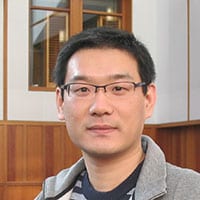Research Summary
The innate immune system is one of the first defenses against infecting pathogens. Tolllike receptors (TLRs) are receptors of the innate immune system that have evolved to recognize conserved features of microbes. A subset of TLRs (including TLR3, TLR7, TLR8, and TLR9) link the recognition of nucleic acids to induction of innate and adaptive immune responses. Although this strategy enables detection of viral nucleic acid within the degradative environment of intracellular compartments, the cost of this strategy is the potential recognition of self DNA and RNA, which has been implicated in autoimmune diseases such as systemic lupus and psoriasis. Accordingly, regulatory mechanisms must exist that prevent responses to self-derived nucleic acids. One such mechanism appears to be the intracellular localization of these nucleic acid-sensing TLRs, which sequesters them from extracellular self nucleic acid released from necrotic cells or apoptotic cells that undergo secondary necrosis. However, the mechanistic details of receptor trafficking and localization remain unclear.
My research project seeks to illuminate the molecular mechanisms regulating the trafficking and localization of TLR9 which both enable detection of foreign nucleic acid and prevent the recognition of self DNA. I am attempting to identify novel proteins associated with TLR9 in various intracellular organelles. I would also like to identify differential interaction partners of endosomal TLRs in order to illustrate how immune cells utilize receptor trafficking to distinguish foreign from self-derived nucleic acids.
Impact in China
Immunology greatly contributes to the understanding of health and disease, and is significantly helpful in the diagnosis and therapy of human diseases. With increasing funding support from the Chinese government, the immunological research in China developed rapidly in the past several decades, along with a higher demand for international scientific communications and networks. With the cutting-edge scientific concepts and techniques gained in UC Berkeley, I sincerely hope to contribute more to immunology research in China in the future, as well as establishing connections between UC Berkeley and my home institute.
Publications
Bo Liu, Yihui Lin, Agus Darwanto, Xuehui Song, Guoliang Xu, and Kangling Zhang. Identification and characterization of propionylation at histone H3 lysine 23 in mammalian cells. J. Biol. Chem. 2009, 284: 32288-32295.
Ya-Rui Du, Bo Liu, Fan Guo, Gui-Fang Xu, Yu-Qiang Ding, Yong Liu, Xin Sun, and Guo-Liang Xu. The essential role of Mbd5 in the regulation of somatic growth and glucose homeostasis in mice. PLoS ONE. 2012, 7: e47358.
Bo Liu, Yuan-Feng Liu, Ya-Rui Du, Andrei N. Mardaryev, Wei Yang, Hui Chen, Zhi-Mei Xu, Chen-Qi Xu, Xiao-Ren Zhang, Vladimir A. Botchkarev, Yu Zhang, and Guo-Liang Xu. Cbx4 regulates the proliferation of thymic epithelial cells and thymus function. Development. 2013, 140: 780-788.
